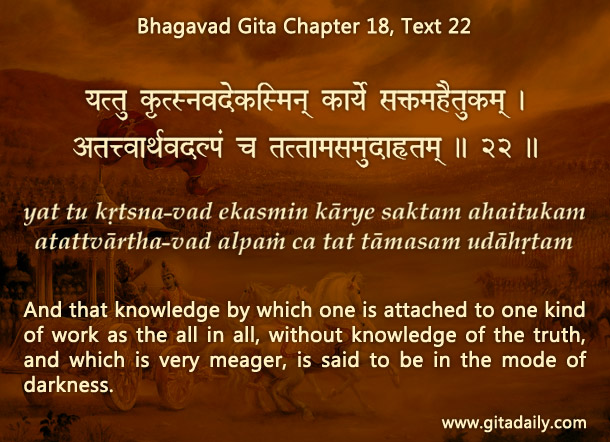Suppose we are driving a car and find it steering off-course towards another lane. Alarmed, we move the steering wheel rapidly, and the car starts racing towards the sidewalk. Instead of compensating, if we overcompensate, we don’t restore balance, but perpetuate imbalance.
A similar overcompensation can happen during our practice of spiritual life. Suppose we hear a talk on austerity and start practicing extreme austerity, say, eating very less. Over time, we start feeling sick or weak or both. Feeling frustrated, we go to the other extreme of eating excessively. Either way, while we are denying the body or pampering it, we are too caught in bodily consciousness to focus on anything higher, such as spiritual reality. Pertinently, the Bhagavad-gita (06.16) cautions that those who eat too much or too little can’t become yogis.
Why do we tend to go towards extremes? Because of fragmented knowledge that makes us mistake one thing to be everything. Such fragmented vision characterizes knowledge in the mode of ignorance (18.22).
We can get a more integrated understanding by studying the Gita systematically. It helps us focus on our life’s ultimate purpose: developing our love for Krishna, our all-attractive Lord. For developing this love, we need to practice bhakti-yoga, which engages the body as a vital tool. Seeing bodily austerity as an aid to absorption in Krishna, we can avoid the extremes of both bodily deprivation and bodily gratification.
To avoid veering off-course, we can take planned prayerful periodic pauses, wherein we evaluate whether our practices are taking us closer to Krishna. If we find that they aren’t, we can, by our prayerful service attitude avoid impulsive overcompensation. Instead, we can calmly discern how to best restore balance and act accordingly.
Such devotional contemplation not only takes us towards absorption in Krishna – it itself comprises that absorption.
To know more about this verse, please click on the image
Explanation of article:
Podcast:


Leave A Comment